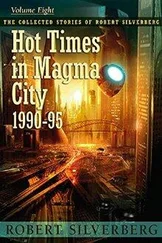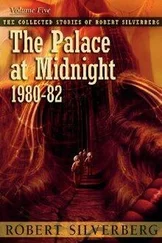Robert Silverberg - How it Was When the Past Went Away
Здесь есть возможность читать онлайн «Robert Silverberg - How it Was When the Past Went Away» весь текст электронной книги совершенно бесплатно (целиком полную версию без сокращений). В некоторых случаях можно слушать аудио, скачать через торрент в формате fb2 и присутствует краткое содержание. Год выпуска: 2007, ISBN: 2007, Издательство: Subterranean Press, Жанр: Фантастика и фэнтези, на английском языке. Описание произведения, (предисловие) а так же отзывы посетителей доступны на портале библиотеки ЛибКат.
- Название:How it Was When the Past Went Away
- Автор:
- Издательство:Subterranean Press
- Жанр:
- Год:2007
- ISBN:978-1-59606-089-0
- Рейтинг книги:4 / 5. Голосов: 1
-
Избранное:Добавить в избранное
- Отзывы:
-
Ваша оценка:
- 80
- 1
- 2
- 3
- 4
- 5
How it Was When the Past Went Away: краткое содержание, описание и аннотация
Предлагаем к чтению аннотацию, описание, краткое содержание или предисловие (зависит от того, что написал сам автор книги «How it Was When the Past Went Away»). Если вы не нашли необходимую информацию о книге — напишите в комментариях, мы постараемся отыскать её.
How it Was When the Past Went Away — читать онлайн бесплатно полную книгу (весь текст) целиком
Ниже представлен текст книги, разбитый по страницам. Система сохранения места последней прочитанной страницы, позволяет с удобством читать онлайн бесплатно книгу «How it Was When the Past Went Away», без необходимости каждый раз заново искать на чём Вы остановились. Поставьте закладку, и сможете в любой момент перейти на страницу, на которой закончили чтение.
Интервал:
Закладка:
“Let’s go back inside,” he said.
“You haven’t finished your—”
“Later.”
He went into the command room. Kamakura had phones in both hands and was barking data into a recorder. The screens were alive with morning scenes, Saturday in the city, crowds in Union Square. Kamakura hung up both calls and said, “I’ve got an interesting report from Dr. Klein at Letterman General. He says they’re getting the first traces of memory recovery this morning. Women under thirty, only.”
“Lisa says she’s beginning to remember too,” Bryce said.
“Women under thirty,” said Kamakura. “Yes. Also the suicide rate is definitely tapering. We may be starting to come out of it.”
“Terrific,” Bryce said hollowly.
Haldersen was living in a ten-foot-high bubble that one of his disciples had blown for him in the middle of Golden Gate Park, just west of the Arboretum. Fifteen similar bubbles had gone up around his, giving the region the look of an up-to-date Eskimo village in the plastic igloos. The occupants of the camp, aside from Haldersen, were men and women who had so little memory left that they did not know who they were or where they lived. He had acquired a dozen of these lost ones on Friday, and by late afternoon on Saturday he had been joined by some forty more. The news somehow was moving through the city that those without moorings were welcome to take up with the group in the park. It had happened that way during the 1906 disaster, too.
The police had been around a few times to check on them. The first time, a portly lieutenant had tried to persuade the whole group to move to Fletcher Memorial. “That’s where most of the victims are getting treatment, you see. The doctors give them something, and then we try to identify them and find their next of kin—”
“Perhaps it’s best for these people to remain away from their next of kin for a while,” Haldersen suggested. “Some meditation in the park—and exploration of the pleasures of having forgotten—that’s all we’re doing here.” He would not go to Fletcher Memorial himself except under duress. As for the others, he felt he could do more for them in the park than anyone in the hospital could.
The second time the police came, Saturday afternoon when his group was much larger, they brought a mobile communications system. “Dr. Bryce of Fletcher Memorial wants to talk to you,” a different lieutenant said.
Haldersen watched the screen come alive. “Hello, doctor. Worried about me?”
“I’m worried about everyone, Nate. What the hell are you doing in the park?”
“Founding a new religion, I think.”
“You’re a sick man. You ought to come back here.”
“No, doctor. I’m not sick any more. I’ve had my therapy and I’m fine. It was a beautiful treatment: selective obliteration, just as I prayed for. The entire trauma is gone.”
Bryce appeared fascinated by that; his frowning expression of official responsibility vanished a moment, giving place to a look of professional concern. “Interesting,” he said. “We’ve got people who’ve forgotten only nouns, and people who’ve forgotten who they married, and people who’ve forgotten how to play the violin. But you’re the first one who’s forgotten a trauma. You still ought to come back here, though. You aren’t the best judge of your fitness to face the outside environment.”
“Oh, but I am,” Haldersen said. “I’m doing fine. And my people need me.”
“Your people?”
“Waifs. Strays. The total wipeouts.”
“We want those people in the hospital, Nate. We want to get them back to their families.”
“Is that necessarily a good deed? Maybe some of them can use a spell of isolation from their families. These people look happy, Dr. Bryce. I’ve heard there are a lot of suicides, but not here. We’re practicing mutual supportive therapy. Looking for the joys to be found in oblivion. It seems to work.”
Bryce stared silently out of the screen for a long moment. Then he said impatiently, “All right, have it your own way for now. But I wish you’d stop coming on like Jesus and Freud combined, and leave the park. You’re still a sick man, Nate, and the people with you are in serious trouble. I’ll talk to you later.”
The contact broke. The police, stymied, left.
Haldersen spoke briefly to his people at five o’clock. Then he sent them out as missionaries to collect other victims. “Save as many as you can,” he said. “Find those who are in complete despair and get them into the park before they can take their own lives. Explain that the loss of one’s past is not the loss of all things.”
The disciples went forth. And came back leading those less fortunate than themselves. The group grew to more than one hundred by nightfall. Someone found the extruder again and blew twenty more bubbles as shelters for the night. Haldersen preached his sermon of joy, looking out at the blank eyes, the slack faces, of those whose identities had washed away on Wednesday. “Why give up?” he asked them. “Now is your chance to create new lives for yourself. The slate is clean! Choose the direction you will take, define your new selves through the exercise of free will—you are reborn in holy oblivion, all of you. Rest, now, those who have just come to us. And you others, go forth again, seek out the wanderers, the drifters, the lost ones hiding in the corners of the city—”
As he finished, he saw a knot of people bustling toward him from the direction of the South Drive. Fearing trouble, Haldersen went out to meet them; but as he drew close he saw half a dozen disciples, clutching a scruffy, unshaven, terrified little man. They hurled him at Haldersen’s feet. The man quivered. His eyes glistened; his wedge of a face, sharp-chinned, sharp of cheekbones, was pale.
“It’s the one who poisoned the water supply!” someone called. “We found him in a rooming house on Judah Street. With a stack of drugs in his room, and the plans of the water system, and a bunch of computer programs. He admits it. He admits it!”
Haldersen looked down. “Is this true?” he asked. “Are you the one?”
The man nodded.
“What’s your name?”
“Won’t say. Want a lawyer.”
“Kill him now!” a woman shrieked. “Pull his arms and legs off!”
“Kill him!” came an answering cry from the other side of the group. “Kill him!”
The congregation, Haldersen realized, might easily turn into a mob.
He said, “Tell me your name, and I’ll protect you. Otherwise I can’t be responsible.”
“Skinner,” the man muttered miserably.
“Skinner. And you contaminated the water supply.”
Another nod.
“Why?”
“To get even.”
“With whom?”
“Everyone. Everybody.”
Classic paranoid. Haldersen felt pity. Not the others; they were calling out for blood.
A tall man bellowed, “Make the bastard drink his own drug!”
“No, kill him! Squash him!”
The voices became more menacing. The angry faces came closer.
“Listen to me,” Haldersen called, and his voice cut through the murmurings. “There’ll be no killing here tonight.”
“What are you going to do, give him to the police?”
“No,” said Haldersen. “We’ll hold communion together. We’ll teach this pitiful man the blessings of oblivion, and then we’ll share new joys ourselves. We are human beings. We have the capacity to forgive even the worst of sinners. Where are the memory drugs? Did someone say you had found the memory drugs? Here. Here. Pass it up here. Yes. Brothers, sisters, let us show this dark and twisted soul the nature of redemption. Yes. Yes. Fetch some water, please. Thank you. Here, Skinner. Stand him up, will you? Hold his arms. Keep him from falling down. Wait a second, until I find the proper dose. Yes. Yes. Here, Skinner. Forgiveness. Sweet oblivion.”
Читать дальшеИнтервал:
Закладка:
Похожие книги на «How it Was When the Past Went Away»
Представляем Вашему вниманию похожие книги на «How it Was When the Past Went Away» списком для выбора. Мы отобрали схожую по названию и смыслу литературу в надежде предоставить читателям больше вариантов отыскать новые, интересные, ещё непрочитанные произведения.
Обсуждение, отзывы о книге «How it Was When the Past Went Away» и просто собственные мнения читателей. Оставьте ваши комментарии, напишите, что Вы думаете о произведении, его смысле или главных героях. Укажите что конкретно понравилось, а что нет, и почему Вы так считаете.












